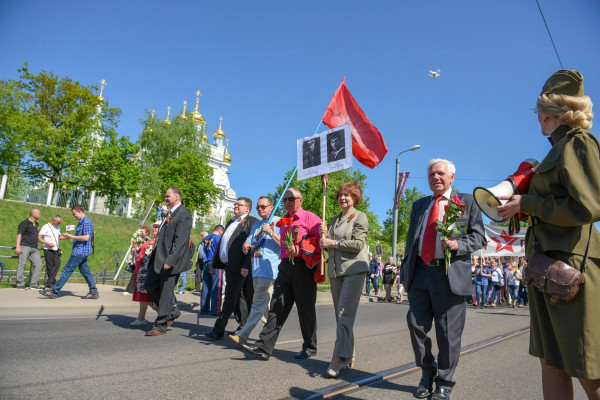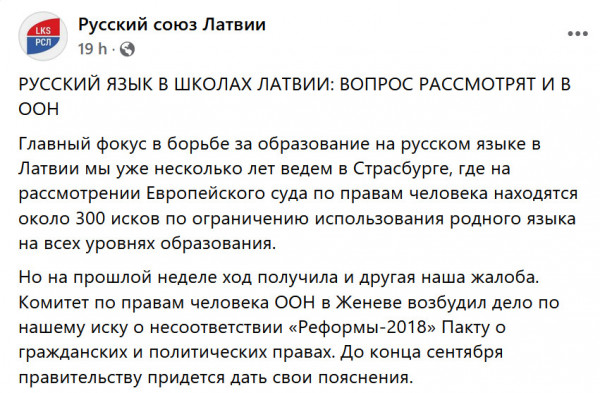Latvijas Krievu savienība party brings a case against Latvia at the UN
The pro-Kremlin party Latvian Russian Union (Latvijas Krievu savienība) has filed a new case against the Latvian state with the United Nations - this time with the Human Rights Committee, demanding that Latvian Russian children be deprived of the right to receive education in the state language. The wartime activities of the political organization led by MEP Tatjana Ždanoka clearly show that Moscow has ordered them to rock the boat in Latvia.
The fact that the party has organized complaints about the education reform in Latvia is in itself not surprising. For years, the language issue and the alleged discrimination against Russians in this country have been the party's favorite topics. Nor is it surprising that the UN Committee has accepted these complaints. Russia's invasion of Ukraine and the failure of the United Nations to exert any influence on the aggressor are testimony to the chronic incapacity of this organization. Russia has veto power in it. Accordingly, any issues of interest to Russia are successfully pushed through the UN bodies at Russia's discretion, including those relating to their "compatriot policies" in the former Soviet republics. The activities of the Latvian Russian Union must be seen in the context of Russia's interests.
The party ignores the State Security Service's warning
The party has been very active throughout the month of the war. Members have demonstrated their support for Russia's invasion of Ukraine on social networks, spread it in public space - adorning themselves with flags of the Russian Federation and calling Ukrainians Nazis. The State Security Service noticed these activities and issued a warning to the party "for activities aimed at justifying violations of foreign policy and international law by the Russian Federation, as well as spreading propaganda messages". Neatkarīgā already reported that "Members of the pro-Kremlin LKS party have been banned from praising the war." In order to prevent the work of the political organization from being questioned in court or even suspended, as the law allows, the party's executive board ordered its members to observe silence in public space and not to flaunt the party's support for Russia. In practice, however, this order has not been complied with. The party has not slowed down its activities, but, on the contrary, has expanded them. Already after the warning from the State Security Service, the party continues to agitate the population to gather for a mass event to honor the Red Army on May 9 at the monument to "Soviet Soldiers - Liberators of Soviet Latvia and Riga from the German fascist invaders". The traditional "Russian world" rally is planned, with the laying of flowers at the foot of the monument, followed by a demonstration of strength and unity.

Reheating the story of discrimination in schools
While the authorities are still thinking about whether and how to restrict the mass gathering of supporters of the Russian regime on May 9, the Latvian Russian Union party is carrying out yet another provocation against the Latvian state. The same old story of discrimination against Russians in the Latvian education system has been reheated. Already in 2021, the United Nations Committee on Economic, Social and Cultural Rights examined Latvia's report on the implementation of the UN International Covenant on Economic, Social and Cultural Rights in Latvia in 2008-2017. In its concluding observations, the Committee called on Latvia to review its language policy and to basically reinstate bilingualism in the education system, as introduced by the Soviet occupation regime. In its explanatory statement, the Latvian government replied that it had no plans to change its language policy and that the transition to teaching in the national language in Latvia would proceed as planned. At the time, three NGOs, including two registered in Russia, appealed to the UN. In order to rehash the story of discrimination against Russians in Latvia once again, the Latvian Russian Union has now acted differently. It has turned to another body - the UN Human Rights Committee. And it has done so not through its sister organizations in Russia, but through pro-Kremlin families in Latvia. And the UN accepted the complaint.
The Latvian language causes them suffering
According to the party's social media account, the complaint it initiated was progressed last week. The Committee has opened a case on the alleged non-compliance of the 2018 reform with the International Covenant on Civil and Political Rights. The Latvian government has until the end of September to provide explanations. The claimants are ethnic Russians, Poles, Armenians, Azerbaijanis, Ukrainians and even Latvians who belong to Latvia's Russian-speaking community. The party claims that, apart from the 34 families of the applicants, 70,000 families whose children are enrolled in national minority programs are victims. And here is how the Latvian Russian Union describes the harm caused to minors by the Latvian language. In pre-school and general education institutions,
"children are subjected to stress and superhuman strain, lose interest in learning, fall behind in development and lose their national identity.
Parents are forced to fill the gaps of formal education with daily help with their homework and home tutors". The Latvian Russian Union is spreading the absurd and dangerous idea that the state language makes Russian children and their families victims in Latvia. Basically, the party is trying to ensure that Latvian citizens with Russian roots are denied education in the state language. Even though all children have the right to receive general education in the state language without discrimination on the basis of ethnicity.

The party shows its subservience to the Kremlin
The scenario is likely to be the same as a year ago. The UN will say that Latvia should take more care of minorities, Latvia will reply that it already takes very good care and will take even better care by providing education in the state language without any discrimination. The Latvian Russian Union, for its part, will report to Moscow on what it has done, and the Kremlin's propaganda tools will spend some time spreading lies about how Russian children are being traumatized in Latvia. It should be noted that the party organized these complaints to the UN at a time when Russia had not yet re-invaded Ukraine. At that time, Latvia's education reform still provided for the preservation of so-called minority schools and for a certain proportion of subjects to continue to be taught in Russian. The war has changed everything. It is unacceptable to leave a part of Latvia's young citizens under the influence of an alien and hostile information space. The coalition is now planning a gradual transition to teaching only in the official language over a six-year period from the 2023/2024 school year. But perhaps even sooner.
For the Latvian Russian Union, this will certainly be an impetus for new activities against the Latvian state and its citizens. However, there is also the possibility that the party will be dissolved for spreading Kremlin propaganda and justifying the war even before the final stage of the education reform begins. The State Security Service has not yet commented on whether it will take the party to court to have its activities suspended, but the warning issued to the party is a prerequisite for such an action. A chance to make amends, so to speak. However, the party has clearly demonstrated its status as an agent of Kremlin influence through its wartime anti-government activities.
Comment by the Ministry of Foreign Affairs
Neatkarīgā asked the Ministry of Foreign Affairs how the Latvian Russian Union's request to the UN Human Rights Committee could affect Latvia's interests. The short answer is that the case against Latvia has indeed been initiated, but the Committee is not a court and its opinions are not legally binding on member states. The Ministry refrains from commenting on the foreign policy activities of the Latvian Russian Union and the damage they have caused to Latvia:
"On March 25, 2022, the United Nations High Commissioner for Human Rights sent to the government of Latvia for its observations a complaint submitted to the UN Human Rights Committee concerning alleged violations of the 1966 UN International Covenant on Civil and Political Rights. The complaint has been submitted by 34 families (91 persons in total) who consider that the education reform in Latvia violates their rights as children of families belonging to national minorities, as guaranteed by Articles 24(1) (the right of children to measures of protection), 26 (prohibition of discrimination) and 27 (right of minorities to enjoy their culture, to profess and practice their religion or to use their language) of the Covenant.
Latvia's observations must be submitted to the UN Human Rights Committee by September 26 this year.
The UN Human Rights Committee monitors the implementation of the Covenant and examines individual complaints alleging violations of the rights guaranteed by the Covenant. The right of an individual to bring a case before the UN Human Rights Committee is provided for in the First Additional Protocol to the Covenant, which entered into force in Latvia on May 10, 1994, with Latvia recognizing the UN Human Rights Committee's competence to examine complaints about alleged violations of the Covenant in Latvia. Upon receiving a complaint, the UN Human Rights Committee informs the state against which the complaint has been lodged, giving the state an opportunity to comment on the admissibility of the complaint and the substance of the allegations made in the complaint. The UN Human Rights Committee shall consider the observations submitted by the parties in closed session and shall thereafter communicate its decision to the parties. It should be noted that the UN Human Rights Committee is not a court of law and its opinions are not legally binding, i.e. they are of a recommendatory nature."
*****
Be the first to read interesting news from Latvia and the world by joining our Telegram and Signal channels.